
Abū Bakr Muḥammad ibn Yaḥyā ibn al-‘Abbās al-Ṣūlī was a Turkic scholar and a court companion of three Abbāsid caliphs: al-Muktafī, his successor al-Muqtadir, and later, al-Radi, whom he also tutored. He was a bibliophile, wrote letters, editor-poet, chronicler, and a shatranj (chess) player. His contemporary biographer Isḥāq al-Nadīm tells us he was “of manly bearing.” He wrote many books, the most famous of which are Kitāb Al-Awrāq and Kitāb al-Shiṭranj.
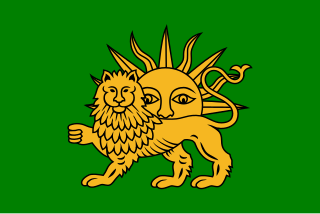
The Safavid dynasty was one of Iran's most significant ruling dynasties reigning from 1501 to 1736. Their rule is often considered the beginning of modern Iranian history, as well as one of the gunpowder empires. The Safavid Shāh Ismā'īl I established the Twelver denomination of Shīʿa Islam as the official religion of the Persian Empire, marking one of the most important turning points in the history of Islam. The Safavid dynasty had its origin in the Safavid order of Sufism, which was established in the city of Ardabil in the Iranian Azerbaijan region. It was an Iranian dynasty of Kurdish origin, but during their rule they intermarried with Turkoman, Georgian, Circassian, and Pontic Greek dignitaries, nevertheless, for practical purposes, they were Turkish-speaking and Turkified. From their base in Ardabil, the Safavids established control over parts of Greater Iran and reasserted the Iranian identity of the region, thus becoming the first native dynasty since the Sasanian Empire to establish a national state officially known as Iran.
Muhammad ibn Isa al-Tirmidhi, often referred to as Imām at-Termezī/Tirmidhī, was an Islamic scholar, and collector of hadith from Termez. He wrote al-Jami` as-Sahih, one of the six canonical hadith compilations in Sunni Islam. He also wrote Shama'il Muhammadiyah, a compilation of hadiths concerning the person and character of the Islamic prophet, Muhammad. At-Tirmidhi was also well versed in Arabic grammar, favoring the school of Kufa over Basra due to the former's preservation of Arabic poetry as a primary source.
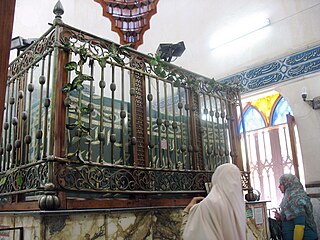
Al-Būṣīrī was a Sanhaji Sufi Muslim poet belonging to the Shadhili, and a direct disciple of the Sufi saint Abu al-Abbas al-Mursi. His magnum opus, the Qaṣīda al-Burda "Poem of the Mantle" in praise of Muhammad is one of the most popular Islamic poems of the genre. It is in Arabic, as is much as his other ode named "Al-Hamziyya".
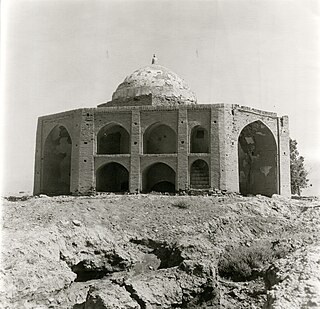
Ashrafuddin Abu Muhammad Hasan ibn Muhammad Husayni Ghaznavi known as Ashraf (اشرف) was a 12th-century Persian poet. A sayyid, he boasted of his lineage from the family of the Islamic prophet Muhammad in his poetry.
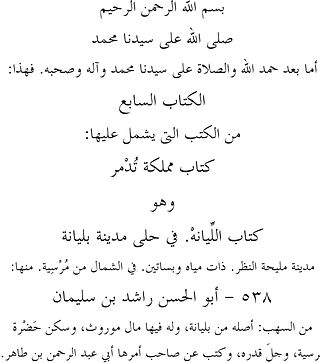
Abū al-Ḥasan ʿAlī ibn Mūsā ibn Saʿīd al-Maghribī (1213–1286), also known as Ibn Saʿīd al-Andalusī, was an Arab geographer, historian, poet, and the most important collector of poetry from al-Andalus in the 12th and 13th centuries.
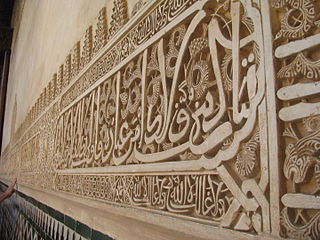
Lisan ad-Din Ibn al-Khatib was an Arab Andalusi polymath, poet, writer, historian, philosopher, physician and politician from Emirate of Granada. Being one of the most notable poets from Granada, his poems decorate the walls of the palace of Alhambra. He is known for composing the muwashahs entitled "Jadaka al-Ghaithu" and "Lamma Bada Yatathanna."

Sayyid Muhammad Sa'id Al-Habboubi was an Iraqi Poet, Faqīh, and a merchant, born in Najaf to a wealthy family.
Umm ‘Alī Taqiyya bint Abi’l-Faraj Ghayth b. ‘Alī b. ‘Abd al-Salām b. Muḥammad b. Ja‘far al-Sulamī al-Armanāzī al-Ṣūrī, also known as Sitt al-Ni‘m, was a poet and scholar, the most prominent female student of Abū Ṭāhir al-Silafī, the leading educator in Egypt in his day.
Muhammad Bahjat Athari was a Muslim Iraqi linguist, historian and a jurist. He was a student and close companion of the Hanafi scholar, Mahmud Shukri al-Alusi.
Faleh Nassif Al-Hajiyah Al-Kilani is an Iraqi scholar, poet, and writer.
Muhammad 'Ali al-Sabuni was a prominent Syrian Hanafi scholar. He is probably best known for his Qur'anic exegesis entitled Safwat al-Tafasir. He died at the age of 91 in Turkey’s Yalova province.
Muhammad Sa'id al-Saggar was an Iraqi poet and calligrapher. He was born in Miqdadiyah in the Diyala Governorate in 1934. He used to be a painter; he ran a publishing house in Paris since 1978, and has been a journalist since 1955. He published his literature and critical articles in many newspapers and magazines. He has published over 14 books of poetry, theatre, the short story, linguistics, art, and other disciplines. He is arguably the most distinguished Iraqi artist-calligrapher in the 21st century. al-Saggar died in Paris on March 23, 2014.
Mohammad ibn Masoud Ayyashi or Mohammad ibn Masoud Ayyashi Samarqandi, known as Ayyashi, was an eminent Shia Islam scholar. He had many works in the field of exegesis of the Quran, Islamic jurisprudence, Arabic literature and hadith. His exegesis of the Quran, known as Tafsir Ayyashi, is his most famous book.
Muḥammad ibn Abī Saʿīd ibn ʿAqīl, possibly only seven years old, was among the martyrs of Banu Hashim in the Battle of Karbala.

Sayyid Muhammad bin Fadlallah al-Sarawi, honorifically titled as Thiqat al-Islam, also known as Muhammad Thiqat al-Islam was an Iranian-Iraqi Ja'fari jurist, writer and poet. He has been renowned at the end of the Qajar era, i.e. the early twentieth century, as a bilingual poet in Persian and Arabic. He was born in Pahneh Kola, a village of Sari to a Tabari Musawi family. He first started his religious educations with his father then moved to Ottoman Iraq and studied from ulema of Najaf and Samarra, such as Mirza Shirazi. His efforts to promote da'wah in Iran failed. As a Twelver Shia mujtahid, he settled in Najaf from 1901 until his death, left behind two poetry collections and many books on fiqh, most of them are manuscript.
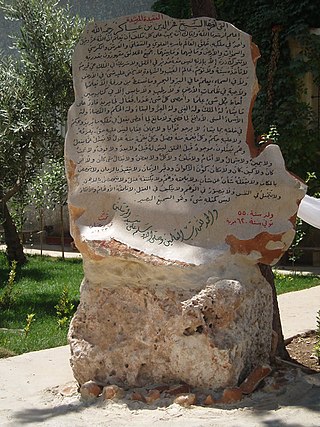
Muhammad al-'Arabi al-Tabbani, also known as Abu Hamid ibn Marzuq was an Algerian Maliki jurist (faqih), Ash'ari theologian, Hadith scholar (muhaddith), historian (mu'arrikh), and a genealogist (nassāba), who was the Imam of the Great Mosque in Mecca in his time.
Muhammad ibn Habib al-Baghdadi, full name Abu Ja'far Muhammad ibn Habib ibn Umayyah ibn 'Amr al-Hashimi, was a ninth-century historian, writer and linguist who lived in Baghdad, Iraq.









